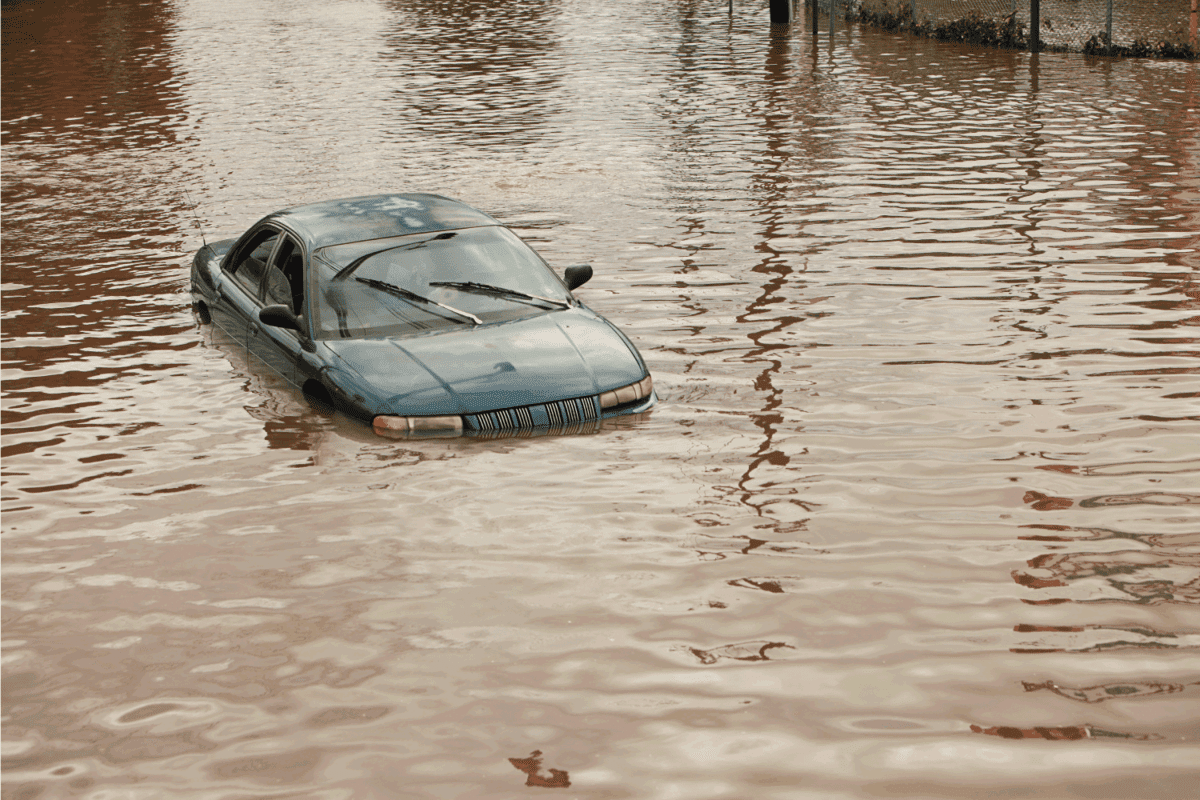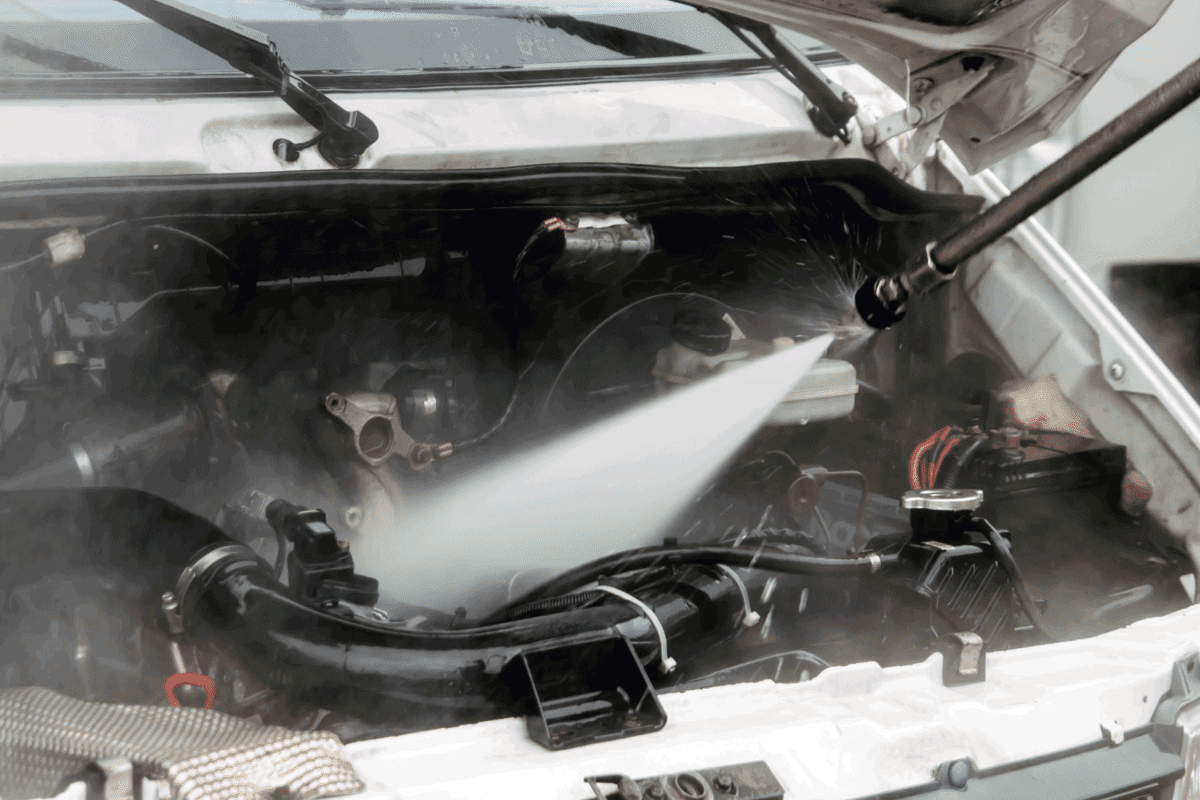Are you looking to find out if car engines are waterproof? Well, we have researched this question and have answers for you.
Car engines are not waterproof. If water gets into the air intake, then the engine will stop running almost immediately. This is true for both gas and diesel engines.
In this article, we will further discuss the relationship between car engines and water. We will look into questions related to what happens when water gets into your car engine, and whether you can resolve the issue. Keep reading to learn more.
![Cleaning car engine from clean care care service. Are Car Engines Waterproof [A Look At Gas And Diesel Engines]](https://vehq.com/wp-content/uploads/2021/10/Cleaning-car-engine-from-clean-care-care-service.-Are-Car-Engines-Waterproof-A-Look-At-Gas-And-Diesel-Engines.png)
Are Car Engines Waterproof?
Car engines are not waterproof because they need air for combustion to work and have easily shorted electrical components. This is true for both a gasoline engine and a diesel engine.
The diesel engine, on the other hand, doesn't have spark plugs. This makes it easier to waterproof than a gasoline engine. For this reason, most military vehicles that you see crossing rivers and streams are diesel.
Gasoline engine or diesel, there are several places that you run into trouble when water gets to your engine. Let's dive into the details.
Air Intake
The first place you run into trouble is the air intake. When water gets into the air intake, it gets into the internal combustion chamber. This can do a lot of damage to your vehicle's engine. It can put your engine into a state known as hydro-locked. This is when the engine won't turn over because it got water in it.
A vehicle that is hydro-locked is often considered totaled. It can cost thousands of dollars for a trained mechanic to fix the problem. If it costs more to fix than the vehicle is worth, then that vehicle is considered totaled.
Crankcase Ventilation System
The crankcase in a vehicle's engine can build up with gasses and damage internal components. The solution is to vent these gasses. This means that the crankcase ventilation system is another place water can get into your engine.
Electrical Components
Engines have various electrical components for different functions. There are motors for fans and windshield wipers, computers to control aspects of the engine, lights for various purposes, and the battery for powering these electrical components.
If water gets to these electrical components, it can easily short them out, rendering them non-functioning. This is another reason why an engine is not waterproof.
Will a car run after being submerged in water?

If your car is completely submerged in water, then it will likely not run anymore. If water got higher than about six inches above the bottom of your door, then enough water should have gotten into hydro-lock the engine.
In most cases, this will result in your vehicle being totaled. It will cost many thousands of dollars to get a vehicle that is hydro-locked to run again.
Motor Biscuit talks about some things you may try to salvage a flooded car. However, there is usually nothing you can do.
What happens if water enters the engine?
Family Handy Man talks about what happens if water enters the engine. When water enters your engine, it gets into the combustion chamber. There the moisture can't escape and builds pressure. This can stop your engine from turning over, which is known as hydro-locked.
It can also build enough pressure to bend the piston rods or even break them. There are stories of people who have had the piston in their vehicle break and explode out of their engine. Usually, the piston shoots downward out of the engine. However, sometimes it may shoot upward instead.
While there aren't any recorded deaths from this occurring, it can still be dangerous. It can be vital for your safety to keep water from entering your engine.
How long does it take for a car engine to dry out?
If you are trying to make repairs to a vehicle that has gotten water in its engine, you will want to make sure that the engine is dried out before your start working on it. This can take a day or two but, there are some things you can do to speed it up.
Make sure that the hood is open. This will allow for good air circulation and let the water evaporate. You may want to direct a fan or two at the engine bay to increase airflow to improve air circulation.
While this will dry out the engine so you can work on it, if your vehicle is hydro-locked or has experienced other water-related damage, drying it out won't fix it. Some people think that if their vehicle stops running because it got water in the engine, they can let the engine dry out before it will drive again, but this isn't the case.
To have any chance of repairing the vehicle, take it to a mechanic. Sometimes if water got to the engine but the vehicle wasn't on, a mechanic can change the oil and use a few tricks to get water out of the engine to get the vehicle running again.
This will only work if a small amount of water got in your engine. If a large amount of water gets in then, the vehicle is likely totaled.
How do I know if water got into my engine?
There are two situations where you would need to know if water has gotten into your engine. The first is if your vehicle is behaving strangely while driving.
The other is when you aren't sure if water has gotten into the engine, but you haven't started the vehicle yet. We will tell you the signs to look for to know if your vehicle has water in the engine whether you have started the vehicle or not.
The Vehicle Is Running
If water gets into your engine, you will notice a few symptoms. The first thing you may notice is that the engine will start to run rough. You may notice it not revving normally or having issues accelerating.
The next thing you may notice is a loud knocking coming from the engine. This is the sound of water getting into your cylinders. This loud knocking is usually followed by your engine coming to a stop.
The Vehicle Is Off
Now, if you think there's a chance water got into your vehicle and you weren't driving it, then it can be essential to make sure there isn't water in the engine before starting it. If you haven't started the vehicle, then there is still a chance a mechanic may be able to flush out the water before severe damage is done.
Start by checking the air filter. If water has entered the vehicle, you may notice a dark area on the air filter or trapped sand and silt. Floodwaters carry a lot of dirt and debris with them, so finding silt or sand in the air filter is a sign that water has likely made it into your engine.
Now check the intake tube. This is the tube leading from the air intake, where the air filter is, to the throttle body. If you find sand or silt here, then that is a bad sign. It means water has poured down from the air intake into the throttle body.
After checking the intake tube, you will want to shine a light into the throttle body. If you see sand and silt there, you can know that water has made it into the engine.
At this point, you can be pretty sure that water has made it into the engine but, there are a few places that you can still check to see how far the water has penetrated the engine.
Additional Check Locations
Start by checking your dipstick. If you see that the oil looks milky, this is a sign that water has gotten in the engine. You can also check if your coolant reservoir has sand or silt.
If water gets into the engine, it usually means the end of the life of that engine. Now, if there is only a little water in the engine, a mechanic may be able to help, so be sure to pay attention to the signs before it is too late.
If you would like to watch a video on checking the engine's various parts for silt and sand, check out Boost Brothers' YouTube video.
Should you wash your car engine?

In general, you don't want to clean your car's engine. A car's engine has a lot of electrical components that can be damaged by washing it with water or spraying too much degreaser.
Also, you don't need to worry about your vehicle overheating if you don't clean it. Car engines are water-cooled and don't need a large amount of airflow to keep the engine cool.
There are, however, specific situations where you should clean your car's engine. This is when there is an oil or coolant leak, and you want to clean it up. If you don't clean it up, it can damage various parts of your vehicle's engine.
So be sure only to clean your car's engine if you need to clean a spill, not just for cosmetics. Scotty Kilmer has a great video explaining in more detail why you shouldn't wash your car engine unless it needs it.
Final Thoughts
Today we learned that car engines are not waterproof. We learned why they aren't waterproof and what can happen if water gets inside. Also, we learned how to tell if water had already accumulated inside.
We hope you enjoyed this article. If you would like to learn more, check out some of these other articles:
